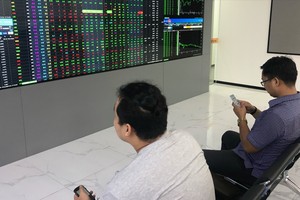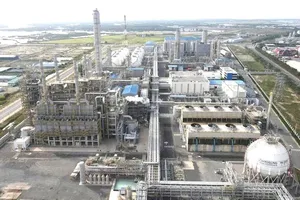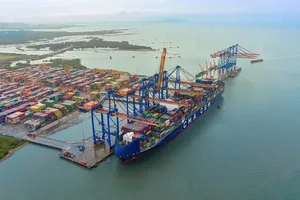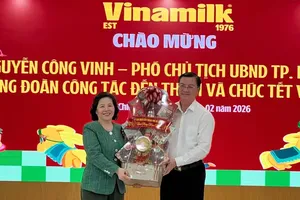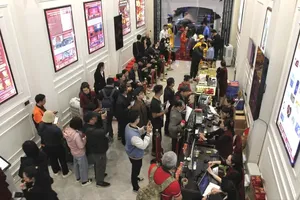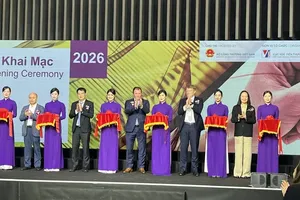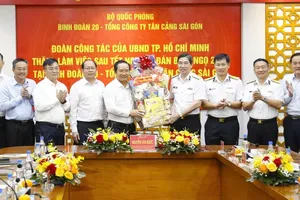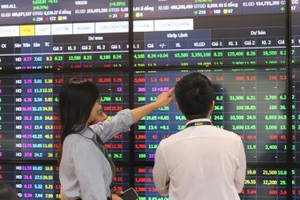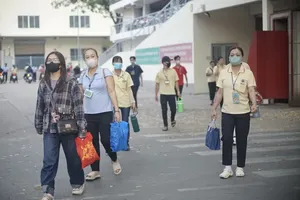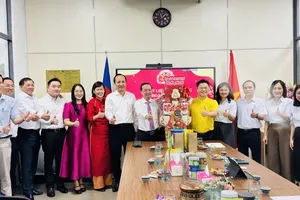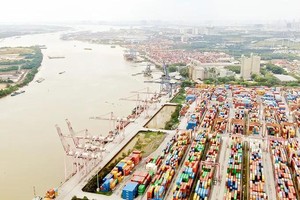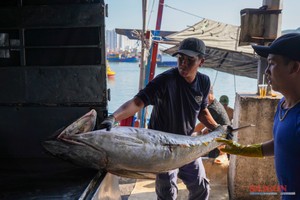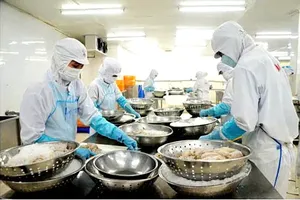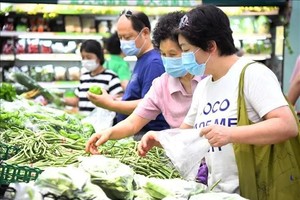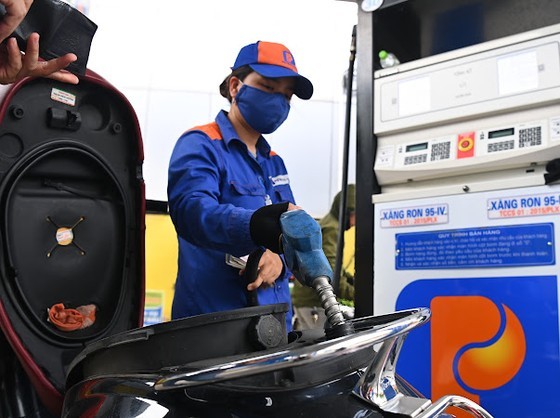 Fuel supply has returned to normal in Hanoi. (Photo: SGGP)
Fuel supply has returned to normal in Hanoi. (Photo: SGGP)
According to a representative of the Ministry of Industry and Trade, recently, some petrol and oil retail businesses have closed or temporarily suspended operations and sold gasoline in moderation, affecting the ability to meet market demand for petroleum products.
The Ministry of Industry and Trade said that, from the end of 2021, the actual costs of petroleum trading had escalated continuously. However, these costs had not been reviewed, adjusted, and correctly and sufficiently calculated when calculating the base price of petroleum products operated by the State, so businesses were not encouraged to import gasoline and oil to supply the domestic market.
While fuel prices increased and the USD/VND exchange rate climbed, many fuel enterprises faced difficulties in accessing foreign currency and credit sources, the report stated.
Therefore, the financial resources of key enterprises were affected, so they only imported a sufficient volume of gasoline and oil to supply their affiliated distribution systems and maintain the inventory as prescribed.
Moreover, petrol and oil trading licenses of some key enterprises in the Southern region were revoked for 1 to 1.5 months due to administrative violations, affecting petroleum supply in some localities.
The General Department of Vietnam Customs stopped the customs clearance procedures for petroleum products of a key petroleum trading enterprise because it did not meet the conditions for electronic data connection according to the provisions of the General Department of Vietnam Customs, applicable from July 1, 2022.
Besides, there are objective reasons, such as the volatile global oil price and the impact of the USD/VND exchange rate.
The Ministry of Industry and Trade said that, from the end of 2021, the actual costs of petroleum trading had escalated continuously. However, these costs had not been reviewed, adjusted, and correctly and sufficiently calculated when calculating the base price of petroleum products operated by the State, so businesses were not encouraged to import gasoline and oil to supply the domestic market.
While fuel prices increased and the USD/VND exchange rate climbed, many fuel enterprises faced difficulties in accessing foreign currency and credit sources, the report stated.
Therefore, the financial resources of key enterprises were affected, so they only imported a sufficient volume of gasoline and oil to supply their affiliated distribution systems and maintain the inventory as prescribed.
Moreover, petrol and oil trading licenses of some key enterprises in the Southern region were revoked for 1 to 1.5 months due to administrative violations, affecting petroleum supply in some localities.
The General Department of Vietnam Customs stopped the customs clearance procedures for petroleum products of a key petroleum trading enterprise because it did not meet the conditions for electronic data connection according to the provisions of the General Department of Vietnam Customs, applicable from July 1, 2022.
Besides, there are objective reasons, such as the volatile global oil price and the impact of the USD/VND exchange rate.
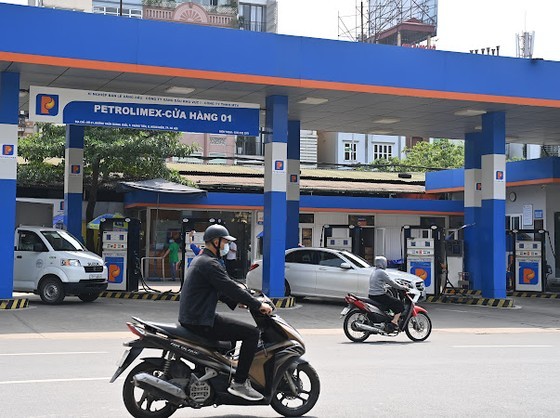 The Ministry of Industry and Trade will direct leading fuel traders to supply enough petrol and oil for the domestic market. (Photo: SGGP)
The Ministry of Industry and Trade will direct leading fuel traders to supply enough petrol and oil for the domestic market. (Photo: SGGP)
While the petroleum output from two domestic oil refineries in the first ten months of 2022 has not reached the set annual plan. According to the Ministry of Industry and Trade, in the first ten months of 2022, domestic production from the two oil refineries merely touched 9.7 million cubic meters, while the registered plan for the first ten months of the year was 9.87 million cubic meters. Thus, there is a shortage of 170,000 cubic meters of gasoline and oil. The Ministry of Industry and Trade said that it would direct leading fuel traders to supply enough petrol and oil for the domestic market, ensuring there is no fuel shortage and meeting the needs of the economy and consumption of the society. At the same time, it would strengthen inspection and supervision to ensure the minimum total petroleum source in accordance with regulations. It will review and propose amendments to Decree No.95/2021/ND-CP and Decree No.83/2014/ND-CP on petrol and oil trading following simplified order and procedures, ensuring scientificity, reasonableness, effectiveness, and feasibility, meeting practical requirements and State management, and harmonizing the interests of the State, people, and enterprises. The Ministry of Finance will coordinate with the Ministry of Industry and Trade and key fuel trading enterprises to review, summarize, and list all expenses related to fuel trading activities periodically before the 20th of each month, and proactively consider the adjustment according to regulations, ensuring it is close to the reality of the market and the operation of petroleum trading enterprises. “This task must be implemented immediately to serve the price adjustment period on November 21. The key petroleum trading enterprises are responsible for promptly, honestly, and accurately reporting information at the request of the Ministry of Finance," the report stated. Earlier, the Ministry of Industry and Trade said that before 10 a.m. on November 15 is the deadline for it and leading petroleum enterprises to report in detail on the norms and costs of petroleum business activities to the Ministry of Finance as a basis for adjusting the expenses constituting the base price of petrol and oil, which will be immediately applied for the adjustment period on November 21.
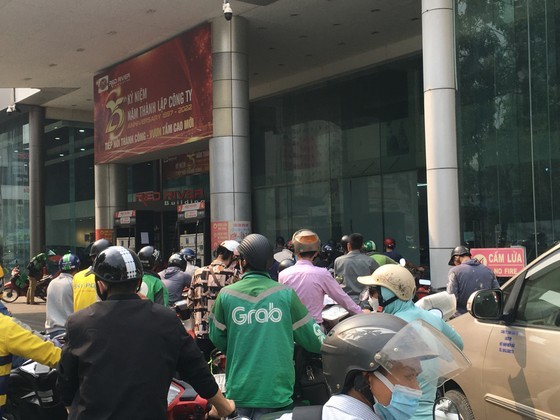 Authorities will proactively consider the adjustment according to regulations, ensuring it is close to the reality of the market and the operation of petroleum trading enterprises. (Photo: SGGP)
Authorities will proactively consider the adjustment according to regulations, ensuring it is close to the reality of the market and the operation of petroleum trading enterprises. (Photo: SGGP)
Accordingly, some key fuel enterprises had a meeting with distributors and general agents to agree on a report to the Minister of Industry and Trade and the Minister of Finance on the current situation of petroleum business activities. These enterprises said that the current cost of importing and bringing petroleum products to Vietnamese ports was VND4,076 per liter for gasoline and VND2,147 per liter for oil, temporarily based on the average import price of the fourth quarter, including premium, freight rate, insurance, and inspection cost. At the last adjustment on November 11, the Ministry of Finance agreed to raise this cost but only increased by VND640 per liter for base gasoline to mix E5 RON92 gasoline, VND1,280 per liter for RON95 gasoline, VND730 per liter for 0.05S diesel oil, VND1,740 per liter for kerosene, and VND1,290 per kg for 180CST 3.5S mazut oil. Thus, this increase is neither accurate nor sufficient with the actual cost when enterprises import petroleum products into Vietnam. As for the cost of circulation of petrol distributors and retailers from the source warehouses to the retailing stage, it was VND1,670 per liter for gasoline and VND1,498 per liter for diesel oil. Thus, the total cost from import to circulation was up to VND5,746 per liter for gasoline and VND3,645 per liter for diesel oil. Therefore, fuel enterprises have continued to propose the Ministry of Finance and the Ministry of Industry and Trade consider updating and accurately calculating the actual costs for the upcoming adjustment period of retail gasoline prices on November 21. At the same time, fuel enterprises have also asked to increase circulation costs, including transportation, loss, depreciation, taxes, payable fees, and management, calculated from petroleum depots to agents and retail gas stations. Fuel retail trading activities were reported to have returned to normal in Hanoi on November 14. At rush hours, only a few petrol stations located at the gateways and arterial roads still saw vehicles waiting in lines for a refill. However, it only took 4-5 minutes for people to finish refueling. At Petrolimex's petrol stations located in residential areas, the number of vehicles dropping by for a refill was small. Nevertheless, many people are still concerned that by the end of the adjustment cycle, the situation of suspending or limiting gasoline sales may recur if the Ministry of Industry and Trade does not closely inspect and supervise the market because global oil prices are rising again.
